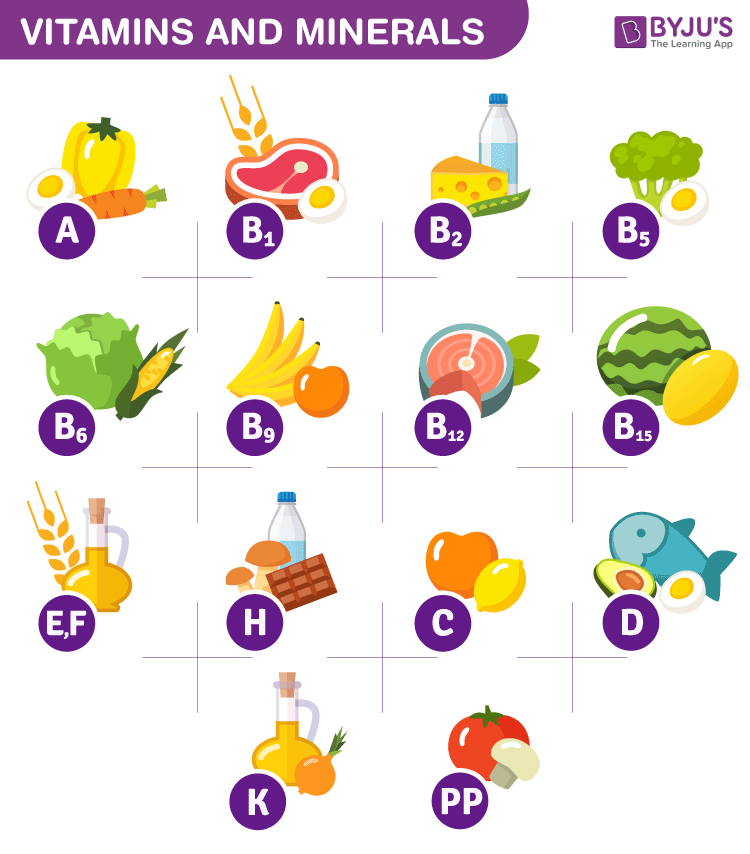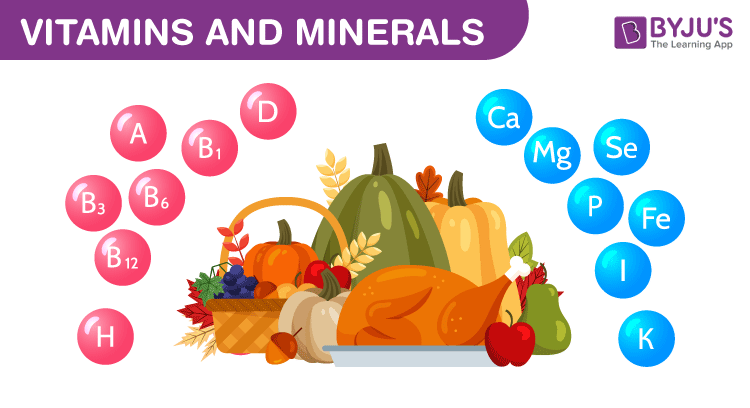Vitamins and minerals are both essential nutrients which are required in a daily diet. Altogether, there are 13 essential vitamins and many minerals which are required for the body to function properly and to maintain the optimal health. Both vitamins and minerals combine to perform hundreds of roles in the body.
Let us learn in detail about these vitamins and minerals below.
Also Read: Difference between Vitamins and Minerals
Vitamins
Vitamins are organic compounds, found in natural foods which are required for normal growth and maintenance of the body. Both humans and animals require vitamins for their growth.
The word vitamin is a combination of Latin words “vita” and “amine” which means life and nitrogen respectively. Casimir Funk discovered a substance that helps in the growth and maintenance of the body and named it in 1884.
Vitamins act as a catalyst in the generation of energy by utilizing carbohydrates and fats properly. Humans cannot live without vitamins and the human body cannot produce it on its own (except vitamin D and Vitamin B3). So it should be taken in required quantities through other sources such as the food we take, vitamin capsules etc. Vitamins can be found in major foods like meat, leafy vegetables, fruits etc.
Vitamin deficiency may cause some diseases and overdose also causes diseases.
Types of Vitamins
Vitamins are of two types:
- Fat-soluble – which are dissolved in fat
- Water-soluble – which are dissolved in water

Here is a table that illustrates the type of vitamins, sources, and diseases due to vitamin deficiency.
| Name | Solubility | Food Sources | Deficiency Diseases |
| Vitamin A | Fat | Green leafy vegetables, ripe yellow fruits, guava, milk, liver, nuts, tomatoes, oranges, carrots, broccoli, watermelon etc. | Hyperkeratosis, night blindness, and keratomalacia |
| Vitamin B1 (Thiamine) | Water | Fresh fruits, potatoes, sweet potatoes, peas, corn, cashew nuts, wheat, milk, black beans, dates etc. | Beriberi |
| Vitamin B2 (Riboflavin) | Water | Banana, dates, mushrooms, grapes, mangoes, peas, pumpkin, popcorn etc. | Slow growth, sore eyes |
| Vitamin B3 (Niacin) | Water | Meat, fish, eggs, milk products, cereals, mushroom, guava etc. | Pellagra |
| Vitamin C | Water | Fresh fruits, black currant, broccoli, goat milk and chestnuts. | Scurvy |
| Vitamin D | Fat | Fish, egg, liver, beef, cod, chicken breast etc. | Rickets and Osteomalacia |
| Vitamin E | Fat | Potatoes, pumpkin, guava, mango, milk, nuts, seeds etc. | Heart problems, Haemolysis and sterility |
| Vitamin K | Fat | Tomatoes, broccoli, chestnuts, cashew nuts, beef, lamb, mangoes, grapes etc. | Haemorrhage |
Minerals
Minerals are also organic compounds found in nature, which helps in the growth of the human body. Minerals are essential for the human body to work properly. Deficiency of minerals leads to several disorders.
List of Minerals, their sources and functions

| MINERALS | SOURCES | FUNCTIONS |
| Calcium | Blackberries, dates, milk, egg, pomegranate, almonds, wheat, soybeans etc. | Important for healthy bones, teeth and immune system |
| Sodium | Passion fruit, onions, fresh fruits, sweet potato, broccoli, pumpkin seeds, eggs, milk etc. | Helps in the regulation of blood pressure and blood volume. It also helps in the proper functioning of nerves and muscles |
| Iodine | Sea foods, iodised salt, milk and foods that are grown in iodine-rich places | Promotes healthy hair, nails, skin and teeth. Also controls body weight and growth |
| Phosphorous | Passion fruit, pomegranate, dates, beef, tuna, oats etc. | Phosphorous along with calcium is necessary for the formation of bones, teeth etc. |
Different animals, plants and other living species have both, common names and scientific names. Similarly, all the vitamins have their respective scientific names. This nomenclature is mainly based on their compositions, physical and chemical properties and their biochemical functions.
What are Vitamins?
Vitamins are the organic compounds which help in performing biological functions of a living organism. It is a vital nutrient that should be included in our daily diet in the required quantity.
Vitamins are referred to as organic compounds, they are required in very small amounts, hence, they are mentioned as micronutrients. They perform vital functions and an essential role in our body functions such as metabolism, immunity and digestion.
Vitamine is a Greek word – “vita”- life and “amine”
Also Read: Types, Sources and Significance of Vitamin
Scientific Name of Vitamins and their Sources

This chart gives complete information about the different types of Vitamins, sources of vitamins and Scientific names of vitamins.
| CommonName | Scientific Name | Food Sources |
| Vitamin A (Fat-soluble) | Retinol | Green leafy vegetables, nuts, tomatoes, oranges, ripe yellow fruits, guava, milk, liver, carrots, broccoli and watermelon. |
| Vitamin B1 (Water-soluble) | Thiamine | Fresh fruits, corn, cashew nuts, potatoes, sweet potatoes, peas, wheat, milk, dates, black beans, etc. |
| Vitamin B2 (Water-soluble) | Riboflavin | Bananas, grapes, mangoes, peas, pumpkin, dates, yoghurt, milk, mushrooms, popcorn, beef liver, etc. |
| Vitamin B3 (Water-soluble) | Niacin | Meat, eggs, fish, milk products, guava, mushroom, peanuts, cereals, green peas, etc. |
| Vitamin B5 (Water-soluble) | Pantothenic Acid | Meat, kidney, egg yolk, broccoli, peanuts, fish, chicken, milk, yoghurt, legumes, mushrooms, avocado, etc. |
| Vitamin B6 (Water-soluble) | Pyridoxine | Pork, chicken, fish, bread, wholegrain cereals, eggs, vegetables, soya beans, etc. |
| Vitamin B7 (Water-soluble) | Biotin | Walnuts, peanuts, cereals, milk, egg yolks, salmon, pork, mushroom, cauliflower, avocados, bananas, raspberries, etc. |
| Vitamin B9 (Water-soluble) | Folic Acid | Citrus fruits, green leafy vegetables, whole grains, legumes, beets, etc. |
| Vitamin B12 (Water-soluble) | Cobalamin | Fish, meat, poultry, eggs, milk, etc. |
| Vitamin C (Water-soluble) | Ascorbic acid | Fresh citrus fruits such as orange and grapefruit, broccoli, goat milk, black currant and chestnuts. |
| Vitamin D (Fat-soluble) | Calciferol | Fish, beef, cod liver oil, egg yolk, liver, chicken breast and cereals. |
| Vitamin E (Fat-soluble) | Tocopherol | Potatoes, pumpkin, guava, mango, milk, nuts and seeds. |
| Vitamin K (Fat-soluble) | Phytonadione | Tomatoes, broccoli, mangoes, grapes, chestnuts, cashew nuts, beef and lamb. |
Classification Of Vitamins
During the beginning of the 20th century, it was clearly understood that the diet containing purified carbohydrates, proteins, fat, and minerals was not sufficient to maintain the proper growth and development of an individual. An English biochemist “Sir Frederick Gowland Hopkins” in the year 1929 was awarded the Nobel Prize for the discovery of vitamins.
Based on their physical and biological activity, these organic compounds are classified into:
Fat-soluble vitamins:
- Vitamin A.
- Vitamin D.
- Vitamin E.
- Vitamin K.
Water-soluble vitamins:
- Biotin.
- Niacin.
- Pyridine.
- Thiamine.
- Vitamin C.
- Folic acid.
- Riboflavin.
- Vitamin B12.
- Pantothenic acid.
No comments:
Post a Comment
SohanGNews